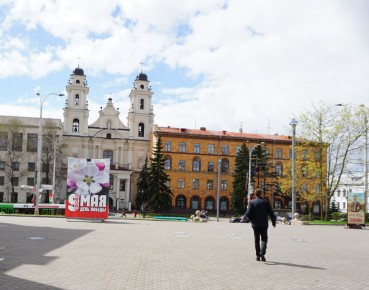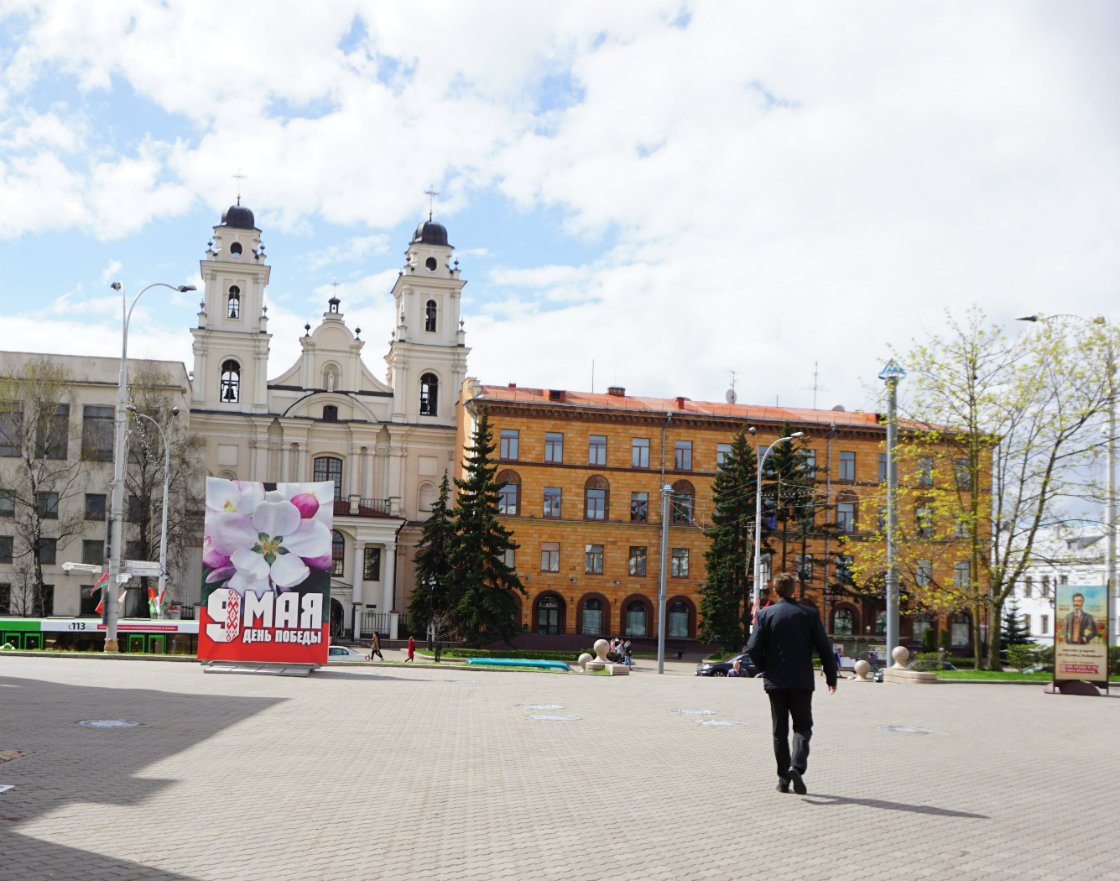Russia is too small to win the war in Ukraine
Category: Macroeconomics

(Andrew Milligan sumo, CC BY 2.0)
Belarus’s GDP declined by 1.9 per cent y/y in January, while industrial production plunged by 5.8 per cent y/y the same month. The result was attributed to a serious cut in crude oil supplies from Russia, after the two countries were unable to secure new supply terms, and the old contracts expired in late 2019. Weak global demand for Belarusian potash, one of the country’s crucially important export earners, has added to the problems of the economy.
Minsk and Moscow spent three months between December and February in extensive high-level negotiations over oil supply conditions. However, as of the end of February, the two sides remain as far from a permanent deal as they were at the start of the talks.
In early January, a temporarily lifeline was thrown to Minsk by Russian oligarch Mikhail Gutseriev, a close business associate of Belarusian President Alexander Lukashenko. Mr. Gutseriev’s companies agreed to supply limited volumes of crude under acceptable conditions.
Despite this help, Belarusian refineries operated at just 50 per cent of their capacity in January and February, according to the Belarusian authorities. The Minsk-based IPM Research Center think tank believes that in reality, this level was even lower — at around one quarter of their maximum capacity.
The main threat to the Belarusian economy is Russian tax maneuvering in its oil industry — Moscow is gradually increasing the mineral extraction tax and reducing oil export duty, with the aim of cutting the latter to 0 per cent by 2024.
As a consequence of these changes, Belarus will purchase Russian crude oil at the world’s price level. Minsk currently buys oil with a 17 per cent discount due to the absence of oil tax duty between the member states of Moscow-led Eurasian Economic Union (EEU).
In the recent months, the Belarusian authorities have demanded that Russia should develop a mechanism to compensate Minsk’s losses that will result from the new tax system. They have also refused to ink a new contract with Russia from 2020, because Russia’s oil companies are demanding an additional USD10-USD12 per ton of crude oil, which Belarus considers unfair during the implementation of the tax maneuver.
The Belarusian government estimates losses from the tax maneuver at USD330m in 2019. Specifically, USD130m were lost by the state budget, and another USD200m by oil refineries. In February, Mr. Lukashenko said that the country foresees a loss of USD420-430m in 2020 as a direct result of the tax changes.
Meanwhile, Fitch Ratings believes that the tax maneuver could lead to “direct costs” of USD10.6bn over the period 2019-2024 if oil prices average USD70 per barrel and Belarus’s refineries increase oil processing to 24 million tons per year, as planned for this year (vs. 18 million tons in 2019).
The IPM Research Center think tank wrote in its November’s forecast that the tax maneuver in Russia “would have substantial consequences for the Belarusian economy; the biggest effects will be felt in the mid- and long-term”. “In the mid-term, the tax maneuver will affect the Belarusian economy in the areas of tax and budget policy, through a need to correct its balance of payments, a rise in fuel prices, a reduction in the profitability of the oil refineries and in the volumes of oil been refined, and a reduction in GDP growth rate including potential growth rate.”
In the long-term, the tax maneuver will lead to an even greater loss in the inter-relations between the economies of Russia and Belarus, through a reduction in the competitiveness of Belarusian enterprises (above all on the Russian market) because of the preservation of unequal conditions of production and sale: the Belarusian government will struggle to subsidize its oil refineries on its domestic market, according to IPM. The think tank estimates the nation’s current account losses at USD1bn in 2019 and USD8.2bn in total for the period 2020-2024.
“The only possible long-term strategy” for the Belarusian government under unequal economic conditions and loss of competitiveness would be to reduce support for the real sector of economy, which mainly remains in the state’s hands, and to reduce the public sector itself, which is most dependent on such support, being oriented, as a rule, to trade with Russia, IPM added in its forecast.
Fitch Ratings estimated the country’s public sector at 47 per cent of GDP in 2017. Meanwhile, multinational donors, including the International Monetary Fund (IMF) and the World Bank, have repeatedly urged Minsk over the past decade to embark on radical reform of its inefficient public sector, which restrains economic growth. “Advancing structural changes is key to reducing vulnerabilities and raising the growth potential of the economy,” the World Bank said in its report published in November.
“One of the main priorities is to strengthen competitiveness and diversify exports through improvements to the regulatory environment and restructuring of the enterprise sector, particularly state-owned enterprises (SOEs) with increasing losses and low productivity. Recent measures to stimulate private sector development have limited effects, unless progress is also made on SOE restructuring to allocate resources for more productive uses and to reduce fiscal risks,” the document reads.
Meanwhile, losses from Russia’s tax maneuver are not the only problem Belarus is currently facing. In 2019, Moscow refused to provide a USD600m of inter-governmental loan to boost Minsk’s foreign reserves, while the Russia-led Eurasian Fund for Stabilization and Development (EFSD) canceled the final USD200m tranche from a USD2bn aid package agreed in 2016.
According to the Russian authorities, further credit support to Belarus is dependent on the two countries agreeing a road map of economic and political integration within the framework of the so-called Union State, formally created in 1996-1997.
Furthermore, Russia has rejected a request from the Belarusian government to restructure a the USD10bn loan for the construction of a nuclear power plant in Belarus. In February, Russian Deputy Finance Minister Sergei Storchak said that the Belarusian government was “urgently asking us to revise the terms of the loan agreement currently in force. Simultaneously extending the repayment period for the loan and cutting the interest rate does not comply with financial theory.”
In April 2019, Minsk said Belarus and Russia were discussing an extension of the loan terms from 25 to 35 years, as well as a reduction of interest.
In this situation, it seems probable that Minsk will turn to the IMF for help, IPM’s head Alexander Chubrik believes. However, this is only likely to happen after this year’s presidential election, which is due to take place before late August. “It would be strange to start negotiations with a government that could be changed after the election,” he tells Obserwator Finansowy.
In 2017, the Belarusian authorities failed to secure a new IMF loan due to the fact that Mr. Lukashenko refused to implement badly needed economic reforms, The IMF’s deputy spokesman, William Murray said at the time that negotiations with Belarus over a new support package were „on hold pending clarity on whether there is a high level of support in Belarus for [reform] policies, particularly in the state-owned enterprises and utility sectors”.
According to Mr. Chubrik, reform of the state-owned sector is understood to mean restructuring, introduction of “normal corporate governance”, downsizing, bankruptcy, and so on. “And given the increasing limitations being placed on the state budget, these are becoming a practically inevitable set of reforms that Belarus has to carry out,” he said.
“As for tariffs, here I think the IMF would be prepared to be maximally flexible, as they understand all the risks of the negative social consequences that would result from raising tariffs on heating. Also, the Belarusian authorities are not against a rise in tariffs; rather, what is at stake is the tempo of increase, and the definition of the market rate. I think that in this instance, the disagreements can be overcome,” Mr. Chubrik added.
Mark McNamee, a London-based practice leader in the DuckerFrontier consulting company, believes that even in the case that discord with Russia continues, ultimately Moscow itself is incentivized to help ensure Belarus doesn’t turn towards the IMF and move farther from Moscow strategically, as Ukraine has.
“Russia would give support, though much more limited one over time,” he tells Obserwator Finansowy. “Meanwhile, from the Minsk point of view, agreeing to an IMF program and undergoing the economic liberalization would be far too politically destabilizing for President Lukashenko to embrace. Thus, the middle ground path — more limited and delayed financial support from Russia matched with a slowing Belarusian economy and very gradual reforms over the very long term — remains the most likely scenario for the country,” Mr. McNamee added.

